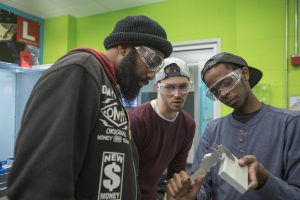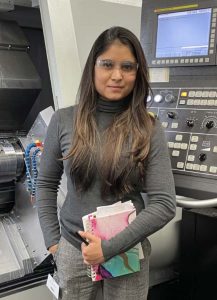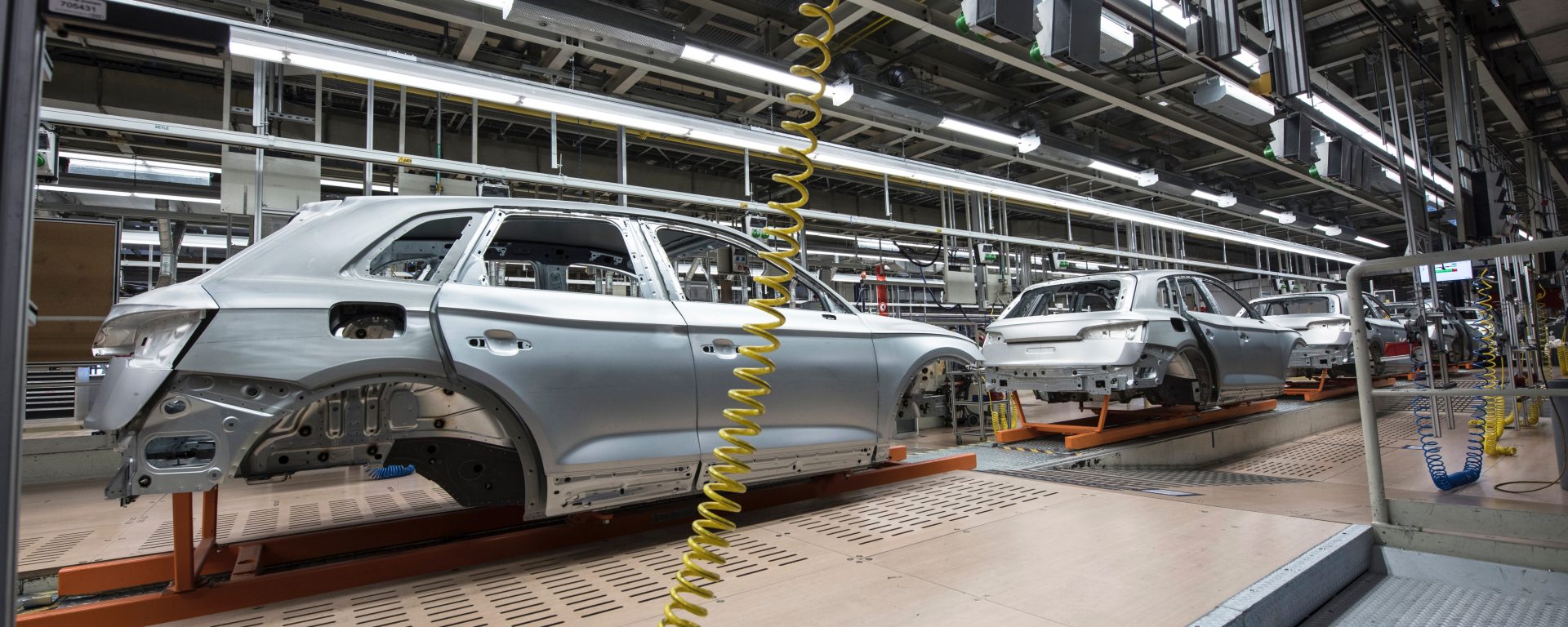Picture this: you’re spending the day at the museum with your family, when a Greek vase catches your eye. Faded with age, it glistens beneath brightly lit glass — shining in all its historic glory. Marveling at this delicate but durable relic, you wonder about the forgotten artisan whose hands crafted this striking ceramic piece.
Several hours later, you exit through the gift shop. Noticing your favorite vase recreated on a keychain, you purchase one at $6 a piece. This 21st-century trinket may seem far removed from the artifact itself, but the two items share more in common than you might think — both were conceived, crafted, and distributed to bring individuals use, comfort, convenience, or joy. Both were manufactured.
October is Manufacturing Month. An often-underappreciated field, the world of manufacturing is more important than many people realize. Products ranging from lifesaving medical technology to ultra-cozy bath slippers would be unavailable for our use if the world of manufacturing ceased to exist.
Read on to discover workers and leaders in this vital industry deserve special recognition — and why joining the ranks of this profession just may be the perfect choice for you.
The journey of an evergreen industry
When you think about manufacturing, what first comes to mind? While many of us may close our eyes and see chrome cogs and steel machines, such innovations are still relatively new. In the days of ancient Greece — and for centuries after — artisans and workers didn’t have advanced equipment at their disposal. Most essential products — as well as those that added happiness and convenience to our lives — were crafted either by hand or with the help of early technology.
Of course, we still enjoy our share of handcrafted goods — just take a trip to Etsy, and you’ll discover endless evidence. However, the butter you just bought is unlikely to have been hand-churned, nor was that scarf you were eyeing at Target crocheted by a single person. Nowadays, shelves are stocked with commercial items produced in massive quantities thanks to state-of-the-art, cutting-edge equipment.
From the spinning wheel to the assembly line
The whole story of manufacturing isn’t quick to tell. Instead of stopping to explore every innovation, let’s take a brief look at some of the most historic highlights of this ever-evolving field.
During the 1800s, in an era known as the Industrial Revolution, the manufacturing industry skyrocketed thanks to technological advancements such as the conveyor belt, which increased the speed and efficiency of production. Other innovations, like the spinning wheel, redefined the textile industry — making it easier to mass produce and distribute essential goods.
In addition to these innovations, the manufacturing process itself became more sophisticated. The most famous example of this is the advent of the assembly line — a strategy in which many people help bring a product to life by performing an assigned step of the assembly process.
Although the introduction of the assembly line is generally credited to Henry Ford, this idea predated his decision to use it to produce Model T cars. However, Ford contributed to making the assembly line a groundbreaking innovation. By refining and revolutionizing this strategy, he redefined the manufacturing process for companies worldwide.
In the United States, the Second World War also marked a pivotal moment in the story of manufacturing—so much so, in fact, that historians often credit the Allies’ victory to American manufacturing. In addition to outproducing the opposition’s weaponry, the high demand for manufacturing workers provided many Americans with reliable income, discounted or free food, and accessible healthcare. This was particularly impactful in the wake of the Great Depression. During the late 1930s and early 1940s, the economy was still uncertain, with many still struggling to make ends meet. Manufacturing careers presented new opportunities for those looking to provide for their families.
Furthermore, this was a revolutionary moment for American women. Because only men were drafted and deployed during this era, the manufacturing industry became bustling with female workers. With the government encouraging women to pursue these jobs through efforts such as the iconic Rosie the Riveter advertisement, many women enjoyed the freedom and pride of working in a field that had previously been a boys’ club. In fact, when men returned from war and reclaimed the workforce, many women were dissatisfied by losing the opportunity to make their own living. As a result, many female rights activists found their voices and were empowered to advocate for equal rights.
Manufacturing in the modern era
As time trudges on, manufacturing technology continues advancing —helping workers satisfy the needs of a growing population in a global economy. Professionals in this field are skilled at using advanced equipment to bring your favorite goods off the assembly line and to the store shelf. In fact, expert manufacturing is often the difference between success and failure for any given product.
Cutting-edge innovations
With the next technological innovation always waiting around the corner, the field of manufacturing is constantly shifting and evolving.
Some of the cutting-edge technologies used by today’s manufacturers include:
- Additive printing, or 3D printing, uses a digital model to generate three-dimensional items from malleable plastic or other material.
- Artificial intelligence, or AI, is the ability of machines, software, or technology to perform complex tasks such as decision-making. As AI is utilized, its accuracy and intelligence increase — meaning that, unlike many other innovations, artificial intelligence improves with age.
- Automation is like AI, but there are a few key differences. Whereas AI is programmed to learn, automation does not evolve or develop knowledge. Consequently, automation is used only to complete repetitive tasks.
- CAD, or computer-aided design, uses computer software to plan, design, and perfect an item — saving manufacturers time, money, and materials by making products safe, consistent, and effective.
- CNC Machining, or computer numerical control machining, cuts and removes material using programmed specifications and instructions. This decreases material waste while helping to ensure that a product’s parts are an accurate size.
Wondering if manufacturing is the career path for you? Explore our Manufacturing programs today and discover your calling!
Why consider a career in Manufacturing?
So, what’s the benefit of pursuing a role in the manufacturing field? Aside from getting to work and refine your expertise with the most exciting technology of today, there are practical reasons why manufacturing is an excellent career path for you.
You’ll be a sought-after professional in a stable field
As the population grows and society advances, our goods and products become more sophisticated and efficient. New products are always hitting the market, and there are always plenty of people in need of these goods.
Furthermore, there’s an abundance of openings in this field. As experienced manufacturing professionals near their retirement, the need for new employees grows. In fact, seasoned workers are retiring more quickly than people are entering the field — leading to an increased need for new and eager employees.
You’ll contribute to the greater good
Whether it’s a state-of-the-art automobile or children’s action figures, the work manufacturers do impacts countless individuals — creating products that support our well-being, add convenience to our daily lives, and bring us comfort and joy.
You can increase your lifetime earning potential
There’s plenty of money to be made in manufacturing. Depending on the kind of manufacturing career you pursue — as well as your credentials and experience level — you’ll have the potential to earn a considerable yearly salary.
But don’t just take our word for it. Here are a few examples:
- CNC Machinists have the potential to earn over $50,000 per year.
- Directors of Operations take home a median salary of over $100,000.
- Experienced metrologists can expect to see about $60,000 annually.
- Manufacturing supervisors can earn an average exceeding $70,000.
- Welders in Connecticut can earn around $50,000 — a range that increases with experience.
How Goodwin supports your future in manufacturing
Goodwin University is home to the School of Business, Technology, and Manufacturing (BTAM). Composed of comprehensive, career-ready programs taught by expert instructors, BTAM is dedicated to helping you achieve a rewarding career in a field full of opportunities.
We offer high-quality programs taught by expert instructors
In addition to being designed with career-focused curricula, our manufacturing programs are taught by savvy industry experts. With small class sizes and expert instruction, you’ll receive the guidance and support necessary to enter the field with confidence.

“I graduated in 2020 with a certificate in CNC Machining. Since earning my certificate, I’ve been able to secure job opportunities that have helped me to be able to support a family of four. I currently work for Enjet Aero, making engine parts for commercial and military aircraft. I love my career, and it was all possible because of the Goodwin faculty and the information and confidence they instilled in me.”
– Ronald Rivas, certificate in CNC Machining
At Goodwin, we put you first. We believe you deserve an accessible, affordable, and flexible education, and we’ll support your journey every step of the way. Learn more about beginning your Goodwin journey today!

“Before Goodwin, I didn’t think pursuing my bachelor’s degree was possible. Goodwin helped me see that I could go to college and work full-time while caring for my family. Goodwin has been a great fit for me!”
– Tiffany Hinkel, AS in CNC Machining
You’ll join a supportive community of learners
At Goodwin, you’ll find a supportive “home away from home” — helping you earn your education in a safe and welcoming environment.

“I had a wonderful experience at Goodwin University. As an immigrant, finding a safe space open to sharing and learning is not always easy. I felt supported by the Goodwin professors and instructors. My associate degree helped me to enhance my skills in my previous role in the inventory department for a manufacturing company. I’m about to finish my BS in Business Administration while working full-time for a multinational tooling company. I am grateful for the Goodwin team that has supported me throughout this process.”
– Thalis Pires, AS Supply Chain and Logistics, BS in Business Administration
You can explore the possibilities before you even enroll
Not quite ready to commit to a specific career path? Don’t sweat it. At Goodwin’s Manufacturing Training Center, located on Park Street in Hartford, you can explore the world of manufacturing free of cost. From virtual welding to robotics, you can gain hands-on practice and discover whether manufacturing is the right field for you.

“Goodwin’s CNC program has allowed me to learn so many new things and has given me the opportunity to obtain a career.”
– Laurence Wanjima, CNC Metrology
We’re connected with manufacturers across the state
The town of East Hartford isn’t only home to Goodwin University — as one of the state’s leaders in manufacturing, East Hartford is also home to Pratt & Whitney, HORST Manufacturing, and other industry leaders. This means you’ll have the potential to complete an internship right here in the community—an opportunity that may even lead to future employment.
But your internship opportunities won’t be limited to the Greater Hartford area. Thanks to Goodwin’s strong ties with manufacturers statewide, the sky is the limit.

“One of the best parts about the CNC program was the internship opportunities Goodwin offered. In the first week, we already had companies coming in to offer internships. I started training at an aerospace manufacturer while still attending college, and it all worked in harmony. Goodwin has great relationships with the Connecticut manufacturing industry, and those opportunities gave students a launchpad for success.”
– Priyansha “Pri” Nayak, CNC Machining, Metrology, and Manufacturing Technology
Learn more about Pri’s journey from working as a manual machine operator in Mumbai, India, to becoming mechanical engineer right here at Goodwin!
Celebrate Manufacturing Month with Goodwin University
Manufacturing Month pays tribute to the hardworking professionals that keep the global economy running — filling shelves with essentials, life-saving medical equipment, comforts and conveniences, and more. Next time you have a moment to spare, take a good look around—most of what you see simply wouldn’t exist without the skill and dedication of manufacturing professionals.
Furthermore, with in-demand opportunities, job stability, high earning potential, and the chance to make a meaningful difference, it’s never been a better time to choose a career in this historic field. And at Goodwin, we’ll be with you every step of the way.
Let’s crush your career goals together. Learn more about Goodwin’s Manufacturing programs today! Call 800-889-3282 or text 860-467-1511.
Goodwin University is a nonprofit institution of higher education and is accredited by the New England Commission of Higher Education (NECHE), formerly known as the New England Association of Schools and Colleges (NEASC). Goodwin University was founded in 1999, with the goal of serving a diverse student population with career-focused degree programs that lead to strong employment outcomes.

